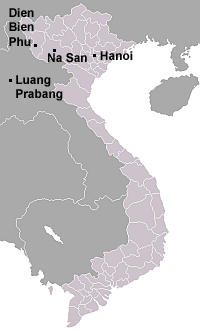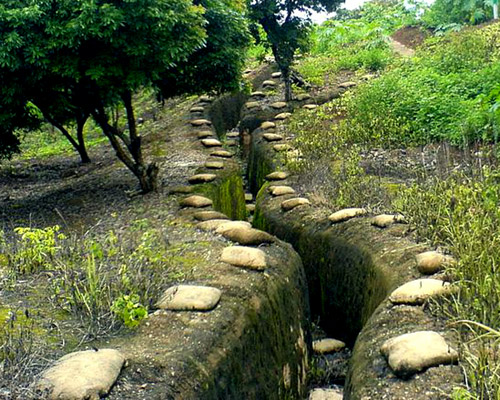
The National Humanities Center (NHC) has been selected to partner with Vietnam National University (VNU) in developing digital instructional resources that allow for a deeper understanding of the American Vietnamese War. This initiative, supported by a $175,000 grant from the Fostering Innovation through Research, Science, and Technology (FIRST) Project for Vietnam, will bring together a team of Vietnamese and American educators, scholars, and situation-based technology experts to form a TransPacific Teacher Scholars program and create a curriculum and digital tools that examine the political, social, cultural, economic, and historical complexities surrounding the conflict.
Focusing on the Black River region and Dien Bien Phu, the team of researchers and educators will seek to tell the region’s layered story using visualization technologies considering questions such as: Why did the U.S. support the side it did in the Vietnam conflict? How can we provide a better understanding of the causes of the Vietnam War by looking at the post-World War II events in and around Dien Bien Phu? And how can students use the humanities to interrogate place and landscape in places like Dien Bien Phu to understand complex layers of culture, history, memory and place?

The U.S. team, led by NHC Vice President for Education Programs Andy Mink, and the Vietnamese team, under the leadership of Ton Quang Cuong, Dean of the Faculty of Teacher Education at Vietnam National University, will work together throughout 2017 to collect, query and analyze data, identify patterns, and then design, create, and publish research-based instructional strategies that use technologies to promote enriched teaching and learning.
This week, a portion of the project team will be discussing plans as they participate in the Fifth International Conference on Vietnamese Studies being held in Hanoi at Vietnam National University. One conference session on “Understanding Complex Landscape of Memory, Commemoration, and Culture with Location-Based Technology” will be led by Mink and includes other team members Albemarle County Public Schools (VA) history teacher Chris Bunin, an expert in GIS-assisted teaching; Matt Dunleavy, co-founder of MoGo Mobile, Inc.; and Christian Lenz, assistant professor of geography at the University of North Carolina at Chapel Hill.
“The Humanities offer a lens through which we can better understand the circumstances of our world and our past,” said Mink. “One of the most complex stories of our American past remains our involvement in the Vietnam War. This project aims to create interdisciplinary and research-based classroom materials that allow for a rich, inquiry-driven approach to unpacking post-World War II Vietnam and as a way of understanding the events and impact of America’s involvement in the 1960s.”
“We are extremely excited to explore this rich cultural and historic landscape,” Mink continued, “and to be working side-by-side with educators and scholars from across the United States and Vietnam to be developing these resources that will bring a broad range of scholarly, pedagogical, and technological perspectives together.”
FIRST is a program of the Vietnamese Ministry of Science and Technology. With World Bank funding, they support innovative projects in several domains including economics, health, agriculture, education that bring American and Vietnamese partners together to use emerging technologies to address specific ongoing challenges. This partnership between the National Humanities Center and Vietnam National University is one of twelve projects selected.
About the Center
Contact
Don Solomon
Director of Communications
919.406.0120
The National Humanities Center is the world’s only independent institute dedicated exclusively to advanced study in all areas of the humanities. Through its residential fellowship program, the Center provides scholars with the resources necessary to generate new knowledge and to further understanding of all forms of cultural expression, social interaction, and human thought. Through its education programs, the Center strengthens teaching on the collegiate and pre-collegiate levels. Through public engagement intimately linked to its scholarly and educational programs, the Center promotes understanding of the humanities and advocates for their foundational role in a democratic society.